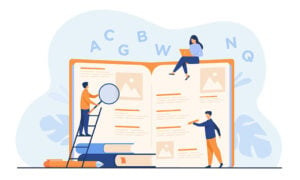Assessing the current English proficiency level of a learner or a group is a very important part of a teacher’s job. It is a difficult skill to master, so in this article, we present some tips on how to efficiently and effectively determine each learner’s level of English language proficiency. You do not have to waste a lot of your precious time on this. Read this article and find out how to do it!
Questions to ask before starting a course
Start with a very short conversation in the native language to find out if the person has ever learned a foreign language before. If not, then it is clear that you need to start from level A0. If the learner assesses their language proficiency at a certain level, ask about the basis for this assessment. Sometimes learners bring a certificate to the first lesson and show it to the teacher. Pay attention not only to the level that appears on the document but also to the date it was obtained. If the certificate was obtained several years ago, it is a good idea to check the current state of knowledge of the learner. You can start with a short conversation for the level and then follow it up with a diversified test that checks several skills in parallel. Sometimes most of the learner’s skills are at the declared level, while one module, e.g. grammar, gives the learner a lot of problems. This may have to do with previous learning experiences. It all depends on what kind of English lesson the learner participated in. Every lesson is different and depends on the tutor. Some tutors emphasize a particular skill or a specific type of vocabulary.
Focus primarily on communication
The fastest way to check your learners’ language level is to have a casual conversation, preferably about a topic they are familiar with, because it will open them up to speaking. For this purpose, you can use ESL Lesson Plans, in which you will find various types of materials that provide a basis for discussion of the topic. Besides, a form of casual conversation is simply enjoyable and is definitely a more pleasant alternative to a multi-page test. Why is it so important? A relaxed learner is an efficient listener who strives to present his or her skills to the full. Stress has a very negative effect on any situation, whether it is a private conversation with an English-speaking friend or an exam. Remember that as a tutor you must strive to eliminate stress!
Prepare your lessons in advance
The speed at which you do the test depends a lot on your preparation. It will make it much easier for you to conduct every English lesson. If you take care of it beforehand and prepare the right materials, everything will go smoothly and in a certain order. One of our suggestions is to create a table. In the left column write down the information about the language level and in the column next to it write down the relevant questions that are appropriate for that language level. In the next column write down grammatical issues and keywords to verify the level in terms of this information. You can also create several thematic categories and highlight them in color. The best idea is to create a visualization that will help you find the relevant material you need more quickly.
ESL Lesson Plans can be very useful for your test. You can choose one module from them and treat it as a test. Remember that listening skills are also very important. There are people who have problems with speaking or grammar, but show a great understanding of native speakers’ speech. Prepare authentic materials, and check them!
Watch the time
Do not spend the whole English lesson checking the learner’s language level. This is way too much! With support materials and the right preparation, you can easily do it in only 10 minutes! Sounds great, doesn’t it? As you can see, checking the appropriate English language level can be nice for both parties. Remember that, as a tutor, you really have a lot of possibilities in this regard!





